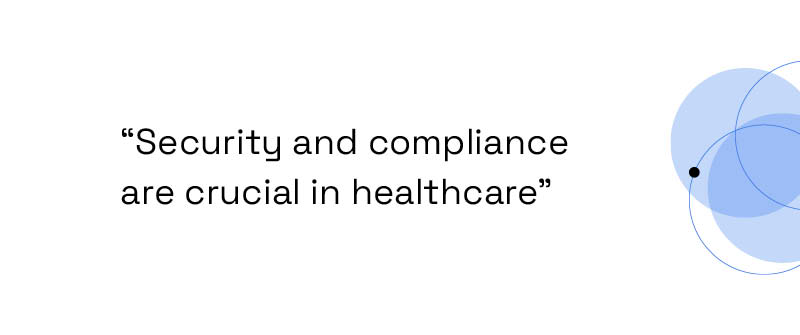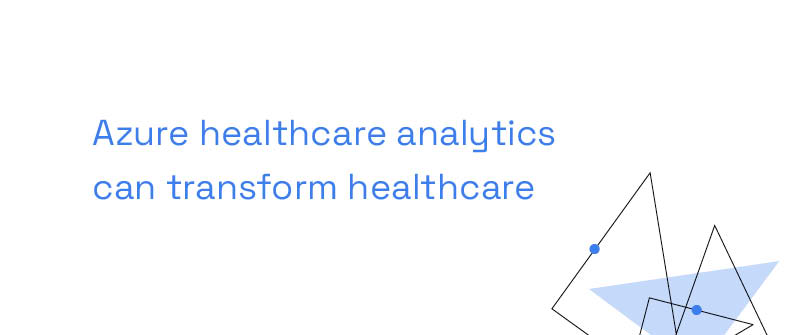
As you probably know, data is the most valuable asset you’ve got—it fuels everything. In healthcare, it can transform everything from operational efficiency to resource optimization to stronger financial performance, and most importantly, better patient care. And healthcare collects a lot of data. According to industry estimates, we’re talking about 30% of the world’s data volume, with the average hospital producing up to 50 petabytes of data each year. But if you’re drowning in numbers and spreadsheets and struggling to make sense of your data, you’re not alone. It takes more than just the right tools; it takes strategy. That’s why many healthcare providers are turning to experts in healthcare analytics consulting to unlock advanced data analytics capabilities, gain healthcare market intelligence, improve clinical outcomes, and manage patient data more effectively, ultimately helping the healthcare industry improve health outcomes, enhance patient engagement, and strengthen risk management practices.
That’s where data strategy consulting comes in. Experienced consultants partner with you to create a solid strategy that taps into healthcare data analytics and focuses on your unique needs. Consultants bring value with industry-specific know-how, the adaptability to shift as priorities change, and the speed to quickly take your raw data and turn it into insights. With expert guidance, you can use analytics to find insights that drive decision-making and improve patient outcomes. I mean, that’s what it’s all about, right?
What Is Healthcare Data Analytics Consulting?
Healthcare data analytics consulting is the key to using data analysis to help you find useful insights from your data. Consultants leverage all the data you collect from various sources like electronic healthcare records (EHRs), lab results, patient and provider surveys, and insurance claims, for example. By collecting, organizing, and analyzing complex healthcare data, healthcare analytics services can uncover insights that help drive strategic decisions for:
- Better Patient Care: Using data analytics, you can find the most useful patient information from mountains of data. With that info, consultants can help you build strategies to spot high-risk patients, create tailored treatments, and improve how you deliver care.
- Greater Efficiency: Analytics help you simplify things by streamlining workflows, reducing waste, and making sure resources go where they’re needed most.
- Lower Costs: By finding inefficiencies, you can create strategies that optimize processes, helping to lower healthcare costs. All while providing quality care.
- Informed Decisions: When decisions are backed by data, healthcare leaders can move forward with data-driven healthcare strategies that they’re confident about.
Healthcare data analytics consulting taps into several core services that help turn complex medical data into strategic decisions. Starting with data integration, consultants unify data from various sources to get a comprehensive view of patient health and operational performance. Next, they’ll apply advanced analytics and data modeling (with tools like AI, machine learning, and statistical analysis) to find patterns, predict outcomes, and uncover valuable insights. Finally, using data visualization, a consultant will transform those insights into dynamic, intuitive dashboards and visuals that give you a 360-degree view of operations. With these core services in play, healthcare data analytics generates actionable insights, helping healthcare teams make informed decisions that improve patient care and operational efficiency.
Critical Condition: Data Challenges Slowing Down Healthcare
Healthcare data analytics helps with challenges like data silos, security and compliance (think HIPAA), and stakeholder complexity. How so? Let’s start with a common theme in healthcare: data silos. With patient records, lab systems, billing, and admin info scattered across multiple systems, it’s impossible to get a unified view of patients or of the organization itself. Data analytics changes that by integrating these disparate sources, so you’ll have a holistic view of patient information and healthcare operations.
Security and compliance are crucial in healthcare (but you already know that). Data analytics solutions have robust security features like encryption and access controls to help with compliance regulations like HIPAA. In addition, when systems are integrated, it’s easier to track access to protected health information (PHI) and to keep audit trails up to date. A consultant can help you create a strong data governance plan that will ensure that data security and compliance are in check.
Lastly, data analytics provides all stakeholders (doctors, clinicians, and administrators) with the information and insights they need for improved decision-making. Data analytics enhances data sharing and collaboration between teams with increased transparency and provides tailored insights of health data to various stakeholders. With data analytics, decisions across the organization are data-driven (not based on gut instincts).

How Does Healthcare Data Analytics Consulting Differ From Hiring a Data Analyst?
Hiring a data analyst vs. an analytics consultant… it’s not really apples to apples. It’s more like the difference between getting a slice of apple pie and getting the recipe, the ingredients, and a baker to take it from start to finish.
Data analytics consultants are strategic (or using the apple pie analogy—take you from start to finish). They’ll come in and assess what you’ve already got in place and where you are in your data journey. From there, a consultant works with you to develop a comprehensive strategy for your data initiatives and then designs, builds, and implements the right data analytics tools. Data analytics consultants have a wide range of specialized knowledge and experience in all areas around data, from creating data models to connecting business processes to training your team (and way more), supporting your whole journey. Not only will they develop a plan, but they’ll also align data insights with your big-picture goals. More good news? Consultants are project-based and work with your team for however long you need, saving you the cost of hiring a full-time employee.
A data analyst focuses on the more tactical side of data analytics vs. big picture (or a slice of pie vs. the whole thing). They handle day-to-day data tasks, including data cleaning, analysis, visualization, and reporting for stakeholders and often support specific teams. Data analysts have a deep knowledge in specific areas and, yes, they are integrated daily with your teams, but you’re paying for onboarding and a full-time salary.
For healthcare decision-makers, the benefits of consulting can make more sense. Onboarding is much faster than hiring an in-house data analyst. They’ll be ready to dig in right away, with a deep industry perspective to build and implement a strategy that fits your unique needs. Plus, a data analytics consultant brings a wide range of expertise, the ability to tap into brain-power from their consulting firm, and the adaptability to pivot as the project needs (or your ideas and visions) change.
What Business Outcomes Can Healthcare Organizations Achieve With Data Analytics Consulting?
One key business outcome from partnering with a data analytics consulting firm is enhancing operational efficiency. Using data-driven insights, a consultant can easily identify areas in need of improvement, streamline workflows by removing unnecessary steps and fine-tuning processes, and optimize resource allocation by looking at how resources are being used and finding ways to improve.
Better patient outcomes are the main goal, right? A consultant can leverage predictive analytics to analyze historical and real-time data to enable proactive interventions and to identify high-risk patients for certain conditions. Predictive analytics can help you dig into genomic data, patient histories, and lifestyle factors, empowering the possibility for tailored treatment plans and prevention of complications before they happen. With predictive insights, medical professionals have the data and insights needed for more informed decisions that improve patient care.
Analytics at Work: Keeping Healthcare Compliant and Cost-Effective
Data analytics in healthcare helps you stay compliant by monitoring and spotting risks before they become bigger problems. Real-time monitoring of data, like electronic protected health information (ePHI), can flag unauthorized access to sensitive data or potential breaches. Automated reporting helps support audits and track compliance metrics. A data analytics consultant can set up robust security measures, train your team for regular risk assessments, and properly implement the right tools that can support HIPAA compliance. Plus, they can establish clear policies to help adherence to HIPAA and other healthcare regulations. Spoiler alert: staying compliant just got less stressful (so you can sleep better at night).
On the financial side, data analytics delivers ROI by cutting costs, optimizing resource allocation, and improving efficiency. You’ll spot inefficiencies in areas like staffing, bed utilization, and OR schedules to streamline operations, plus predictive modeling can reduce readmissions and identify patients at risk of chronic conditions. This way you can plan for early interventions that prevent costly hospital stays. It can even optimize your supply chain by analyzing inventory levels and supply expenses.
Performance and market trend analysis help you identify areas for growth to expand services and make strategic investment decisions. Analytics also allows you to spot billing errors, automate claims submissions, and support tailored payment plans for self-pay patients, improving collections and cash flow.
When it comes to value-based care, analytics gives providers a clear view of cost, quality, and patient experience metrics. Predictive models can sort patients into risk categories, identifying at-risk patients early and guiding individualized treatment plans. With the ability to track adherence to clinical guidelines, you’ll easily identify areas to improve the quality of care.
How Do Power BI, Azure, and Microsoft Fabric Fit Into Healthcare Analytics Solutions?
Microsoft has some powerhouse tools when it comes to healthcare analytics solutions, including Azure, Power BI, and Microsoft Fabric for healthcare. Let’s take a look:
Power BI: In healthcare, data overload and siloed data make it tough for providers and administrators to see the big picture (and slow down decision-making). Power BI consulting in healthcare solves that by integrating data across departments, giving you end-to-end visibility into patient and operational data. A Power BI consultant can develop real-time, insightful dashboards that are easy to read and understand. Decisions are informed, faster, and driven by up-to-date data (not intuition).
Azure: Azure healthcare analytics can transform healthcare. First off, Azure comes equipped with advanced security features that help protect sensitive data, while flexible and scalable storage grows right along with you. An Azure consultant will set this up the right way so you know your data is secure, scalable, and ready for advanced analytics.
A consultant can tap into advanced analytics by building predictive models that leverage machine learning and AI for AI-driven insights that can predict patient outcomes, optimize treatment plans, and forecast the future. Consultants can use tools like Azure Synapse Analytics to handle complex queries and analysis, and natural language processing to analyze unstructured texts such as doctors’ notes.
Microsoft Fabric: Microsoft Fabric’s integration with Power BI can unify data management from collection and storage to transformation and visualization all in one place. Microsoft Fabric consulting brings the expertise to set up a comprehensive solution so you can manage, analyze, and leverage data and create seamless dataflows that can improve patient outcomes. Also, depending on your healthcare organization’s environment, you may need hybrid or legacy system connections to tap into data management with Fabric. A good consultant makes a huge difference here with the knowledge to set up those connections properly. With all data in one place (good riddance silos), decision makers get the full picture for more holistic decisions—faster than the patient list increases during flu season.

Consulting: Your Fast Track to Healthcare Data Analytics
Power BI consulting in healthcare helps accelerate adoption by working with your team and sharing their experience so they feel confident using new tools and technologies that power Azure healthcare analytics. When your team feels overwhelmed and unsure of how to use tools, adoption will be a struggle—and adoption is a huge key to success. P3 Adaptive can add customized training to consulting that is expert-led and fit to match your goals and your team’s needs.
With Microsoft Fabric integration, you’re getting cloud healthcare analytics all under one roof. When set up properly by a consultant, using a unified, powerhouse team like Fabric and Power BI, you’ll maximize ROI.
And when you work with our expert team, we can help you start winning right away (and see faster ROI). We won’t get rid of what you already have. Instead, we’ll leverage your current healthcare systems with cutting-edge platforms like Fabric and Power BI to quickly gain insights into your healthcare data using data analytics. Our team is data experts—we solve data challenges and design solutions that take you to the next level. Your healthcare organization will be streamlined and efficient, enabling you to improve patient care. Let’s build a strategy that taps into healthcare data analytics. Whatever your vision for better care, we’ll make it a reality.
Get in touch with a P3 team member